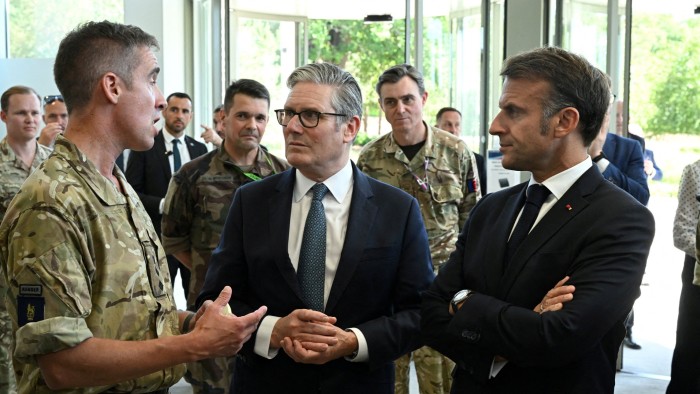This article is an onsite version of our Europe Express newsletter. Sign up here to get the newsletter sent straight to your inbox every weekday and fortnightly on Saturday morning. Explore all of our newsletters here
Welcome back. “Finally, we meet again.” Emmanuel Macron adopted an almost wistful tone in his address to a joint session of parliament this week marking the first day of his state visit to the UK. It is 17 years since a French president, Nicolas Sarkozy, was last afforded the honour. That is the longest interlude between state visits since Vincent Auriol was greeted at Victoria Station by George VI and treated to a ceremonial procession to Buckingham Palace.
It says a lot about the cross-Channel rift caused by Brexit and the subsequent snubbing of the EU by Britain’s Conservative leaders, although things began to improve under Rishi Sunak.
For Macron, the visit was a moment to turn the page on Brexit and celebrate what his officials called a “reconvergence” of interests between the two countries. “Our solidarity knows no institutional limits,” he pronounced.
British media homed in on Macron “provocatively” warning in his Westminster speech of “excessive dependencies on the US and China”, although it’s been a favourite talking point of his for years.
By all accounts, Europe Express readers appear to share his concern about Europe’s strategic dependencies on the US. We asked you two weeks ago in a poll how far you thought Donald Trump was committed to collective defence in Europe. Only 6 per cent of you thought he was committed; a whopping 78 per cent felt he did not care at all.
I’m at ben.hall@ft.com
Opposites attract
State visits by French presidents and British monarchs have a ritualistic quality: pageantry, careful references to historical rivalry, tributes to Churchill and other mutually admired figures and endless reformulations of the entente cordiale. As Paris correspondent, I covered Sarkozy’s state visit to London in 2008. Former UK prime minister Gordon Brown bettered his counterpart’s wish to turn the entente cordiale into an entente amicale by calling, clunkily, for an entente formidable.
Brown and Sarkozy were temperamental and political opposites but managed to hit it off. It helped that Sarkozy flaunted his Anglo-Saxon affinities as a way of showing how different he was from his Gaullist predecessor Jacques Chirac. Sarkozy went on to sign the Lancaster House treaty with David Cameron, ushering in deeper defence co-operation between Europe’s two largest military powers before the relationship was detonated by Brexit.
For decades, the relationship between leaders has been coloured by a lingering mistrust. Paris never fully abandoned de Gaulle’s view that the UK was a Trojan horse for US interests in Europe; London has too often dismissed French policy as driven by gallic self-aggrandisement. Parts of the UK media and political class see a bit of Bonaparte in every French leader. “Victorious Macron arrives at summit to accept Starmer’s Brexit surrender” was the Telegraph’s curtain-raiser on the state visit. It was telling that Macron felt it necessary to state on Thursday that trust had now been established between the two countries — and between him and Sir Keir Starmer. You can’t imagine him saying the same thing about German chancellor Friedrich Merz.
Inevitably, attention has focused on points of contention between Britain and France, especially the problem of clandestine cross-channel migration in small boats. But, as the FT’s editorial board argues, they cannot allow their relationship to be defined by that issue.
Special responsibility
At a time of war on European soil and with Trump ripping up the rules-based international order and turning against America’s allies, the fundamental interests of Britain and France have never been so aligned. Their relationship over the coming years should be defined by ever-closer co-operation on defence. Macron told MPs and peers that Britain and France, the continent’s two strongest military powers each with a nuclear deterrent, had a “special responsibility” for European security “and it is time to articulate it”.
As the FT’s Janan Ganesh writes, “at least in the medium term, the fate of Europe rests in large part on Britain and France”. It will take time for Germany’s ambitious defence spending plans to translate into real fighting capabilities. Even then, the country’s political leaders need to develop a “strategic culture”, a willingness to project force. Poland is building a formidable military but also lacks recent experience of war fighting.
Paris this week agreed to “co-ordinate” its nuclear deterrent with London in the event of an extreme threat to European security, a significant step towards extending its force de frappe to the rest of the continent, while Britain’s nuclear umbrella is already extended to the rest of Nato. They will also expand the size of their Combined Joint Expeditionary Force to 50,000 and deepen their collaboration on long-range missiles.
Europe will also need London and Paris to work together to help organise a transition away from dependence on US military assets, such as reconnaissance, satellite intelligence, air transport and mid-air refuelling. European capitals will need to work out what capabilities they need and whether they need to buy these collectively. If the EU takes a central role in financing such a generational effort, it could lead to a closer relationship with the UK.
As Ian Bond argues in this commentary for the Centre for European Reform, European capitals may soon have to conceptualise what a European pillar in a Nato with less America or no America actually looks like. France and the UK blazed the trail for a European Security and Defence policy with their landmark St Malo agreement in 1998. The EU has neither the right membership nor the capabilities to take over responsibility for collective defence, Bond writes. It is time to invent something new. That will not happen unless France and the UK can agree.
Britain, France and the necessary relationship by Janan Ganesh
Ben’s pick of the week
Bosnia, 30 years on: the looming in the Balkans, by Alec Russell and Marton Dunai




